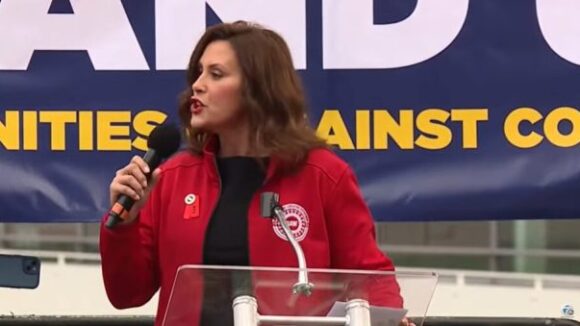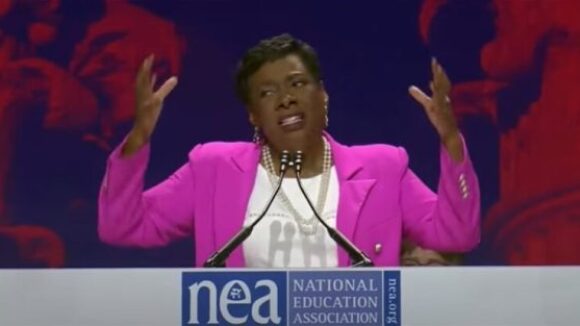Tyranny Triumphs in the Great Lakes State
Ignoring ample evidence of forced unionism’s unfairness and its damaging impact on jobs and incomes, Big Labor Michigan Gov. Gretchen Whitmer signed Right to Work destruction in 2023.
(download the September 2016 NRTWC Newsletter)
This summer, federal judges in courts located more than 1,100 miles from one another sharply chastised Obama-appointed U.S. Labor Secretary Tom Perez for attempting, by bureaucratic fiat, to prevent employees from hearing all the key relevant facts before they are subjected to union monopoly control.
 And one of these judges enjoined Mr. Perez and his Labor Department from proceeding to implement his rewrite of federal employee/employer-relations law.
And one of these judges enjoined Mr. Perez and his Labor Department from proceeding to implement his rewrite of federal employee/employer-relations law.
A nationwide injunction is warranted, concluded Senior U.S. District Judge Sam Cummings in Lubbock, Texas, because the “scope of the irreparable injury” that would almost certainly result from enforcement of the so-called “persuader” rule is “national,” and because the rule is “facially invalid.”
Labor Secretary’s Clear Intent Is to ‘Control What Employees Hear’
There’s no doubt about the pro-collectivization-of-employees bias of the National Labor Relations Act (NLRA) and the Railway Labor Act (RLA), the two federal statutes that together set the ground rules for unionization campaigns in well over 90% of America’s priAct (RLA)vate-sector workplaces.
The NLRA and the RLA set very modest conditions that union officials must meet before they acquire so-called “exclusive” representation power to negotiate the pay, benefits, and other terms of employment of all the workers in a group.
And once this power is granted it is almost impossible to remove. In fact, researchers drawing on published federal data estimate that only roughly 10% of today’s unionized private-sector workers ever had a chance to vote on whether they wanted to be represented by a union.
But federal labor law does tacitly recognize that, when employees collectively decide whether or not they will be unionized, they have, as then-Justice John Paul Stevens put it in a 2008 majority opinion for the U.S. Supreme Court, an “underlying right to receive information opposing unionization.”
National Right to Work Committee President Mark Mix commented:
“Tom Perez has long been trying to undermine the High Court’s 7-2 ruling eight years ago in Chamber of Commerce v. Brown. His clear intent in promulgating his ‘persuader’ rule is to control what employees hear during a union organizing drive.”
No Other Administration Has Adopted Obama Team’s Twisted Reading of 1959 Law
Many employers whose employees are being urged to unionize believe their employees should have a chance to hear all the key relevant facts before they make a collective decision.
However, federal bureaucratic regulations and court decisions have for decades tightly limited what employers may say under such circumstances, despite the seemingly broad protection afforded by statutory law.
Unless they can receive expert legal advice, therefore, even employers who care a great deal about their employees’ freedom may well opt to say nothing.
And that’s exactly why Mr. Perez has relentlessly attacked employers’ ability to receive such advice.
In April, the Labor Department finalized his “persuader” rule, which is designed to gut employees’ right to hear both sides of the story regarding union representation.
Since the 1959 Labor Management Reporting and Disclosure Act (LMRDA) was adopted, every presidential administration has interpreted it to require employers to file extensive paperwork with the federal government regarding their labor consultants only if those consultants communicate directly with their employees.
Even the intensely pro-forced unionism Jimmy Carter and Bill Clinton Administrations never interpreted it to impose burdensome paperwork requirements on employers who only seek expert advice as they and/or their managers communicate with employees, orally or in writing, about what unionization could mean.
Cost of Hiring, Retaining Staff To Fill Out Disclosure Forms Too High For Many Small Firms
However, under the Obama Labor Department’s new “persuader” rule, the LMRDA’s “advice” exemption is effectively nullified.
If an employer hires any individual or firm for virtually any kind of assistance related to a unionization campaign, reams of paperwork are required.
The cost of hiring and retaining qualified staff to fill out complicated disclosure forms that most small businesses normally don’t have to file will suffice to deter many from seeking any advice. And without expert advice, most will likely deem it prudent to go mute when union organizers call.
Case Charging That the Rule ‘Violates Free Speech’ Rights Is Likely to Succeed
But the rulings issued by U.S. District Judge Patrick Schiltz of Minnesota on June 22 and by Judge Cummings on June 27 are raising hopes for freedom-loving employees and their employers that Mr. Perez’ scheme to expand Big Labor’s monopoly-bargaining empire by bureaucratic edict won’t succeed.
Judge Schiltz was responding to a challenge to the “persuader” rule brought forward by an association of law firms that represent and advise clients on labor and employment matters.
He found that the plaintiffs “have a strong likelihood of success on their claim that the new rule conflicts with the plain language of the LMRDA.”
Despite reaching this conclusion, Judge Schiltz opted not to enjoin the “persuader” rule at this time.
But five days later, in his opinion regarding a case filed by the National Federation of Independent Businesses, Judge Cummings issued a nationwide injunction.
In explaining his decision to halt the rule, the Texas judge said he had concluded the plaintiffs would likely win their pending case that the rule “violates free speech and association rights protected by the First Amendment.”
‘Single-Party’ Elections Have Never Been Acceptable In the United States
Moreover, there is a strong basis for contending the rule is “unconstitutionally vague in violation of the due process clause of the Fifth Amendment.”
Mr. Mix commented:
“‘Single-party’ elections, in which the rules are rigged to ensure only one side’s message gets heard, are regarded as normal under despotic governments in places like China and Cuba.
“But they have never been acceptable in America. Now is not the time to start.”
Mr. Mix added that there is a real danger that the federal court system, despite the promising rulings by Judges Schiltz and Cummings, will ultimately fail to do its duty and block Tom Perez’ unconstitutional scheme to help Big Labor drag more and more workers into unions from ever taking effect.
That’s why the National Right to Work Committee stands ready, if necessary, to turn up the pressure on Congress to block enforcement of the “persuader” rule.
Hillary Clinton’s ‘Short-Listing’ Of Tom Perez Illustrates Her Anti-Right to Work Extremism
By the time this edition of the National Right to Work Newsletter reaches its readers, they will already know whom Big Labor Democrat presidential candidate Hillary Clinton has chosen as her running mate.
But as this is written a few days prior to the opening of the Democratic National Convention, her choice is still up in the air, and it is being widely reported that Tom Perez is on her “short list” of potential running mates.
“The fact that Hillary Clinton is even thinking about sharing her ticket with a relatively obscure Obama Cabinet member who has never been elected to an office higher than the Montgomery County [Md.] Council seems odd at first,” said Mr. Mix.
“But it isn’t odd once you recognize that having cooked up a Big Labor-‘friendly’ rule that is, in the words of Judge Cummings, legally ‘defective to its core’ is a sign of commendable commitment to the cause of compulsory unionism, as far as Ms. Clinton is concerned.
“Regardless of whether or not she ultimately makes Mr. Perez the Democrats’ candidate for Vice President, her obvious admiration for the man illustrates her extremism.”

Ignoring ample evidence of forced unionism’s unfairness and its damaging impact on jobs and incomes, Big Labor Michigan Gov. Gretchen Whitmer signed Right to Work destruction in 2023.

Largely thanks to the Right to Work attorney-won U.S. Supreme Court decision in Janus v. AFSCME, union bosses like NEA President Becky Pringle are no longer able to block virtually all meaningful education policy reforms.

Avelo employee Kim Howard believes all the firm’s flight attendants should get to vote on continued AFA rule. Credit: WTNH-TV (ABC,…